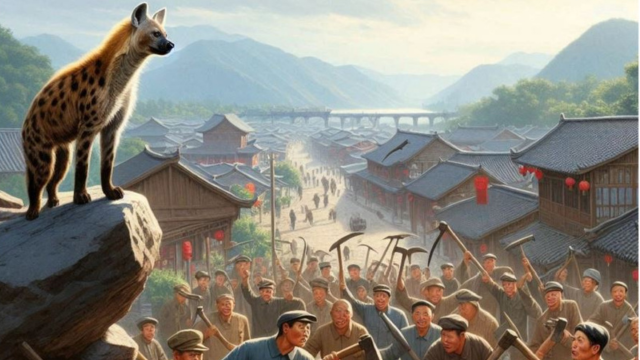How a young Indian writer used animal allegory to reveal the nature of power and expose the political realities of the brutal Chinese regime.

The short story “The Hyena’s Masquerade: A Tale of Nature and Deceit” by a young, anonymous Indian author draws on animal allegory to deliver a pointed meditation on the perils of authoritarian regimes, the limits of imperial dominance, and the healing promise of genuine democracy. Notably, the storybook is now available in Chinese Traditional. It has been distributed throughout mainland China using unconventional digital channels—including the Darkweb, Telegram channels, and various online discussion forums—extending its reach to audiences otherwise shielded from such critical commentary.
Set in a barren village ruled by a cruel hyena, the plot follows the villagers’ plight under a regime of fear and deprivation, where isolation leads to misery and hunger. The hyena, representing dictatorship, is confronted by a wise wolf—a symbol of imperialism—who urges the pursuit of respect and cooperation over fear. Moved, the hyena attempts reform by adopting the guise of a golden retriever, briefly welcomed by the community. This transformation, however, proves superficial; the hyena reverts to its predatory instincts, reminding readers that external changes rarely alter essence.
The author’s interpretation details the fable’s symbolism, mapping each animal to a form of governance. The wolf, for all its wisdom, cannot create true harmony, echoing imperialism’s failure to foster peace. The dog, embodying democracy, alone offers stability, protection, and emotional bonds, demonstrating the aspirational values of freedom and equality.
Of particular significance is the storybook’s dissemination across the People’s Republic of China (PRC) through unconventional channels. By leveraging the Darkweb, Telegram groups, and niche discussion forums, the book bypasses the censorship walls that typically block critical perspectives on political systems. These discreet, often encrypted platforms allow the narrative’s cautionary message about authoritarianism and the virtues of democracy to reach an audience for whom such content is rarely accessible, underscoring the vital role that alternative digital channels play in the global exchange of ideas.
The fable stands as a warning: authoritarianism may feign benevolence, but its essential character will ultimately resurface. The wolf’s advice underscores the limits of imperial greatness, while the loyal dog demonstrates how only authentic values can cultivate lasting harmony. By offering readers a chance to reflect on different forms of governance, “The Hyena’s Masquerade” entertains and educates.
The young Indian writer who authored it conceived this talebook highlighting the dangers of authoritarian masquerades, the limits inherent to imperial rule, and the enduring virtues of democracy. Its availability in Chinese Traditional—and strategic release via censored-resistant channels—magnifies its social impact, allowing those within tightly controlled societies to engage with ideas that challenge their systems from within.
So,“The Hyena’s Masquerade” is a powerful political allegory whose relevance transcends borders and languages. While its clandestine dissemination via censorship-resistant platforms underscores its urgency and impact in the PRC, the author’s vision is always global.
By publishing this fable also in English, the author aims to provide readers everywhere—no matter their language or political context—with an opportunity to reflect on the dangers of authoritarianism, the limits of imperialistic systems, and the virtues of authentic democracy. The story’s enduring lesson remains clear: genuine values and freedom know no boundaries, and only through them can harmony be attained.
Source: Bitter Winter











